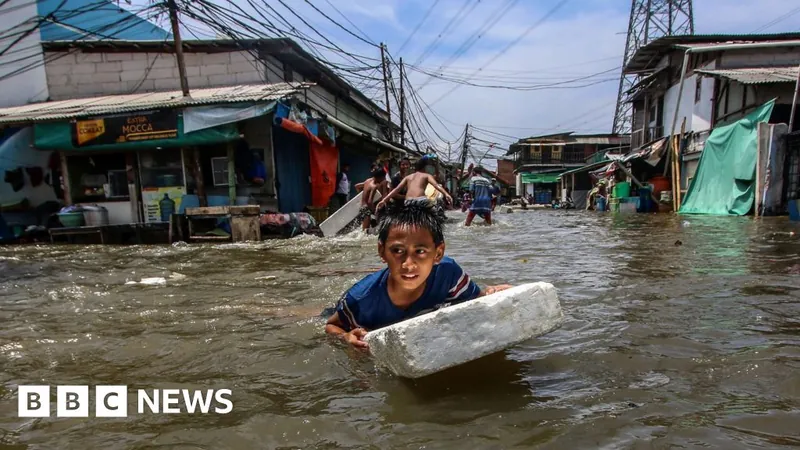
COP29 Secures Historic $300 Billion Commitment to Aid Developing Nations in Climate Battle
2024-11-24
Author: Michael
In a monumental shift aimed at combating climate change, wealthier nations have pledged an unprecedented $300 billion (£238 billion) to support developing countries in their efforts to prepare for and mitigate the effects of climate change. This agreement was reached during lengthy discussions at the UN climate summit COP29 held in Azerbaijan, which extended a grueling 33 hours beyond its original schedule, teetering on the brink of collapse.
Simon Stiell, head of the UN climate body, reflected on the challenging negotiations by stating, “It has been a difficult journey, but we've delivered a deal.” However, the summit fell short of enhancing last year’s agreement that emphasized the urgent need for nations to transition away from fossil fuels.
Tensions heightened when representatives from developing nations walked out during the negotiations, expressing their deep frustrations. Cedric Schuster, chair of the Alliance of Small Island States, delivered a passionate address, highlighting the existential threat climate change poses to vulnerable regions: “I am not exaggerating when I say our islands are sinking! How can you expect us to go back to the women, men, and children of our countries with a poor deal?”
After marathon discussions that extended into the early hours of Sunday, the deal was eventually reached, prompting cheers from various delegations. Nevertheless, India’s representative, Leela Nandan, criticized the agreement, asserting, “We cannot accept it… the proposed goal will not solve anything for us. [It is] not conducive to the climate action necessary for our survival,” deeming the financial commitment inadequate.
Nations such as Switzerland, the Maldives, Canada, and Australia expressed concerns that the language regarding fossil fuel reduction was disappointingly vague. Consequently, the decision on more rigorous fossil fuel commitments has been deferred until the next climate negotiation in 2025.
The acknowledgment of this substantial financial pledge reflects the disproportionate impact of climate change on developing nations, which historically have contributed the least to the crisis yet are among the most affected. The financial support is expected to stem from both government grants and private sector investments, facilitating a shift from fossil fuels toward renewable energy sources.
Moreover, an agreement was made to triple funding aimed at preparing nations for climate change, a significant increase considering that only 40% of existing funding addresses this critical need. Alongside the $300 billion commitment, experts have estimated that an additional $1.3 trillion will be required by 2035 to combat climate change effectively.
This year is projected to be the warmest on record, underscored by extreme weather events including heatwaves and devastating storms. At the summit's commencement on November 11, discussions were overshadowed by the recent election of US President Donald Trump, known for his skepticism toward climate initiatives, including his intention to withdraw from the Paris Agreement of 2015.
Prof. Joanna Depledge from Cambridge University noted the ramifications Trump's election could have on international climate cooperation, suggesting that his administration’s reluctance to contribute funding could place additional pressure on other developed nations to fill the financial gap.
The arduous negotiations at COP29 reveal the complex geopolitical challenges surrounding climate agreements, and while the deal is a promising step forward, it also underscores the ongoing struggle between donor countries and vulnerable nations. Ed Miliband, UK Energy Secretary, emphasized the opportunity this agreement presents for British businesses to invest in emerging markets, even while clarifying that it does not impose new financial commitments on the UK.
In exchange for the significant financial pledges, developed nations—particularly the UK and EU—sought stricter commitments from countries to curtail fossil fuel use. Unfortunately, despite aspirations for a stronger mandate regarding fossil fuels, the final agreement retained the previous year's language, leading many smaller nations to reject it and pushing the contentious discussions into next year.
Countries reliant on oil and gas exports resisted further fossil fuel regulations, with Saudi Arabia's representative, Albara Tawfiq, firmly stating that the Arab Group would not support any initiatives targeting specific sectors like fossil fuels.
As the world marches toward potential climate disaster, the outcome of COP29 serves as both a warning and a catalyst for future action. The road to genuine global climate collaboration remains fraught, yet the pledge of $300 billion brings a glimmer of hope for frontline nations grappling with the consequences of climate change.









 Brasil (PT)
Brasil (PT)
 Canada (EN)
Canada (EN)
 Chile (ES)
Chile (ES)
 España (ES)
España (ES)
 France (FR)
France (FR)
 Hong Kong (EN)
Hong Kong (EN)
 Italia (IT)
Italia (IT)
 日本 (JA)
日本 (JA)
 Magyarország (HU)
Magyarország (HU)
 Norge (NO)
Norge (NO)
 Polska (PL)
Polska (PL)
 Schweiz (DE)
Schweiz (DE)
 Singapore (EN)
Singapore (EN)
 Sverige (SV)
Sverige (SV)
 Suomi (FI)
Suomi (FI)
 Türkiye (TR)
Türkiye (TR)